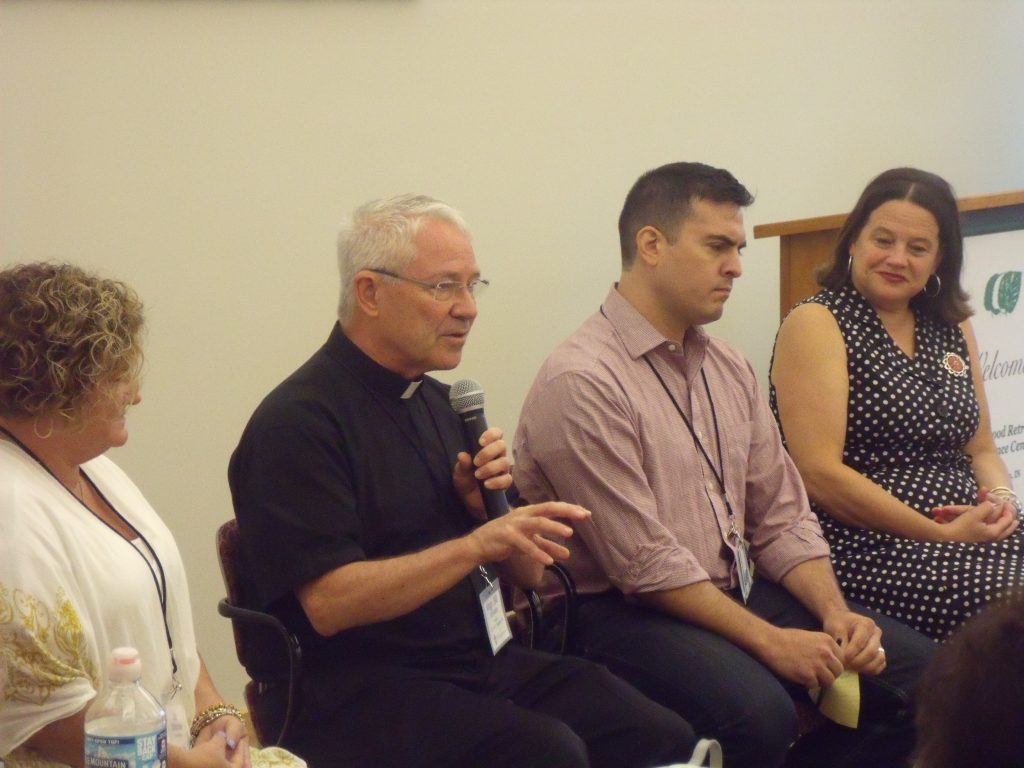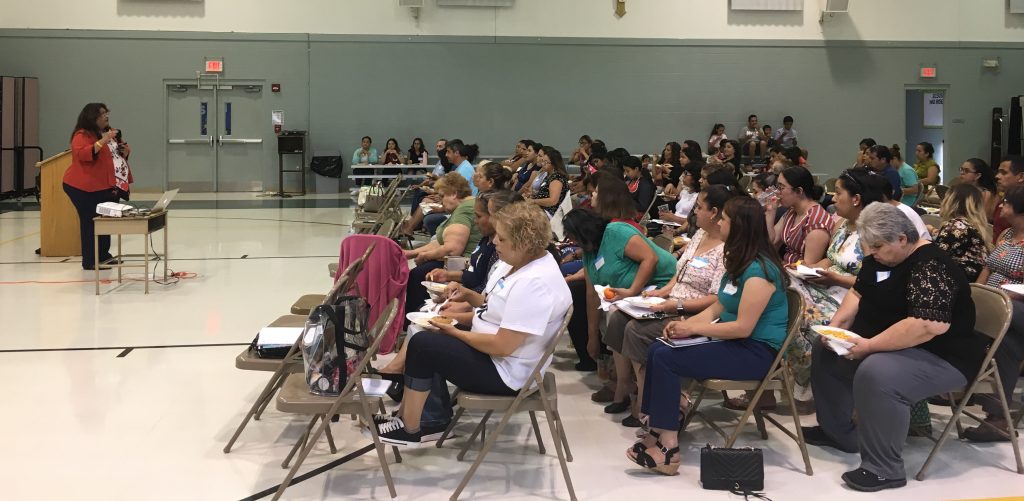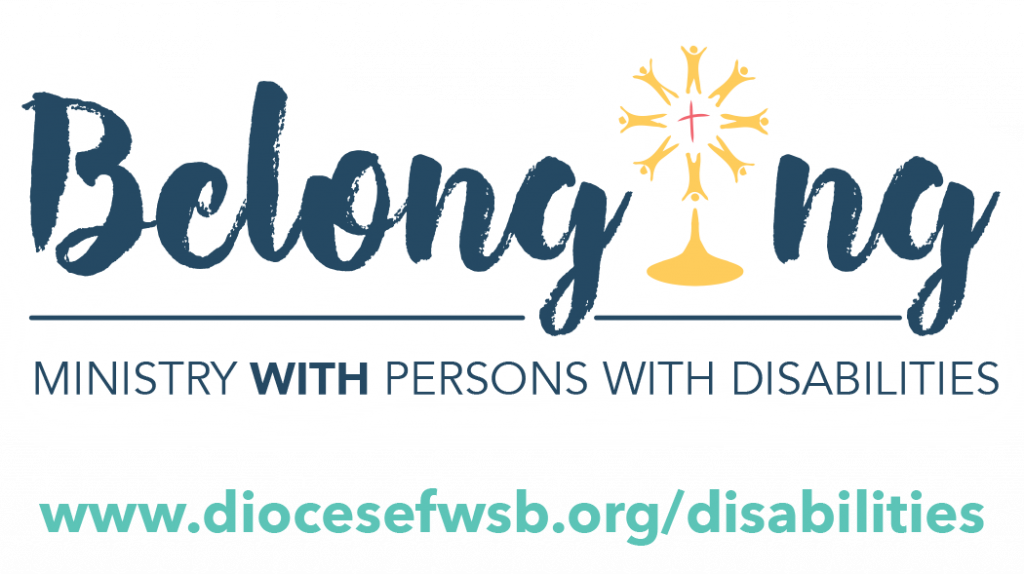July 31, 2019 // Diocese
Belonging ministry welcomes everyone to the Lord’s table
“Have you ever considered asking people in a wheelchair where they would like to sit?”
This seemingly simple question represents a paradigm shift in the work of the Diocese of Fort Wayne-South Bend in its Ministry with Persons with Disabilities.
Allison Sturm leads the ministry, which is called “Belonging,” along with Mary Glowaski, assistant to the bishop in pastoral care. Both women ask meaningful questions like this one now because of changes in the methods of ministry with those who have disabilities.
The week of July 14, the ministry hosted the National Catholic Partnership on Disability Great Lakes Regional Meeting for the first time. At Lindenwood Retreat and Conference Center in Donaldson, representatives from 10 dioceses and three states joined together to share best practices, pray together and grow in service to families and persons with disabilities. Dr. Miguel Romero, theologian and professor at Salve Regina University, offered the keynote address and participated in the follow-up panel discussions; Msgr. William Schooler celebrated Mass and participated on the panel, and staff of the Diocese of Fort Wayne-South Bend shared the news of recently initiated collaborations among diocesan staff who are amplifying the ministry’s reach.

Msgr. William Schooler speaks on a panel about developing sensitivity to ersons with disabilities, based on his own upbringing, during the National Catholic Partnership on Disability Great Lakes Regional Meeting in July at Lindenwood Retreat and Conference Center. — Jennifer Miller
Sturm and Glowaski encouraged the directors and ministers present to, as a starting point, listen closely to the people they are serving. Grassroots direction of growth allows the fruit of the ministry to blossom, they said, because it is rooted in the needs of the people being served.
In the past, Sturm noted, “we would plan programs and start initiatives we thought were important and wanted. Now we are listening to what people are telling us they need, and responding.”
“I really had to look at myself and had to let go of my fear of not having all of the answers” in regard to best practices for her ministry, she shared. “It is not our ministry, but rather a ministry of our Church. We are now seeing exponential awareness and growth, after trying for years and just putting on programs.”
Glowaski agreed. “Our core question now is: “Who is not at our table? Our purpose is to be with people.”
The mission of the Diocese of Fort Wayne-South Bend’s Ministry with Persons with Disabilities is “to ensure meaningful participation with individuals with disabilities and their families in all aspects in the life of the Church.” Its mission statement also states that it is “the collaborative effort of individuals, families, educators, caregivers, parish staffs and diocesan personnel who network, provide guidance, share resources, offer support and are dedicated to promoting awareness, acceptance, inclusion and inspiration so that all individuals with disabilities may have the experience of Belonging.”
The umbrella term “disability” can be used for anyone who lives with physical or mental issues that require assistance, Romero said. There is no distinction regarding the size of the disability. He has written that just being aware of one’s “innate vulnerability to impairment, illness and injury” can fall be under the title of disability.
During the conference, he emphasized that everyone, at some point in their lives, experiences “a vulnerability and coordinate dependencies of our body.” Living this human experience in a Christian manner, realizing that there is much to learn and determining to not shy away from this dependency changes the terms of what one might typically imagine is a disability.
“All of us are capable of responding in love,” Romero explained of the essential qualities of being human being. “We all are growing in our capacity to understand and respond in love. It is not something extraordinary but rather ordinary.”
Patrick Romzek of the Archdiocese of Detroit, a participant at the conference, spoke to a cultural gap. Often times, he said, he has heard pastors say that there isn’t anyone in their parish with a disability. Given that at least 13 percent of the U.S. population lives with a profound disability, Romzek said he has found that such statements miss the mark. Are people with disabilities welcomed in the parish? Is there room for them, literally? Are enough parking spots reserved? Are sidewalks, ramps, accessible bathrooms and hearing and seeing devices offered?
Local collaboration
Sturm and Glowaski spoke about the work that has already been accomplished by the Diocese of Fort Wayne-South Bend’s new methodology, as well as the work they are committed to bring to completion. Belonging groups currently meet only in Fort Wayne, although more groups may be established in other areas of the diocese after first listening to what is needed. They also noted the support that has been given by Bishop Kevin C. Rhoades for the ministry.
Belonging meeting agendas are not set by Sturm and Glowaski: rather, group members are empowered to structure their own gatherings with their own notes and goals. The members come from backgrounds including special education teachers, parents or caregivers of a person with a disability, and catechists trained to serve children with disability; but they all know the need of families for the Church to welcome and make room for them, say “yes” and not “no” to receiving the sacraments, to learn from one another and to support and walk with each other as they journey toward heaven.
In 2017, the U.S. Conference of Catholic Bishops released a revised edition of the “Guidelines for the celebration of the Sacraments with Persons with Disabilities,” explaining how those with disabilities may receive the sacraments, how they can be prepared, and the pastoral ways to support them. At the conference, local diocesan representatives from the Catholic Schools Office and offices of catechesis, Hispanic ministry, liturgy and worship and adult faith formation all spoke on ways they currently have and are planning on serving the need found in their ministries for persons with disabilities.
How to respond
After sharing their stories, breaking open their lives and testimonies to God’s grace, conference participants asked questions of the panelists. During each period of discussion, a repeated query arose. How can a parish respond to the needs of those with disabilities?
Sturm suggested: “Listen. Start by listening to the people that come with their needs. They know well what they need. In a humble spirit of service, offer what you have, connect them with those who can support and find out if you’re not sure.”
Sturm’s focus emphasizes accompaniment, which mirrors what Catholic theology has always held, what Scripture speaks of and Jesus Himself actually practiced: Walk with God’s people. Listen to them, love them, discern with them, and serve them.
With this seemingly small shift, the Diocese of Fort Wayne has found — and is continuing to find— deep and lasting fruits.
For more information about Belonging or the Office of Ministry with People with Disabilities, visit www.diocesefwsb.org/Ministry-with-Persons-with-Disabilities.

A workshop at St. John the Evangelist Parish, Goshen, July 16 provided tools with which Spanish-speaking catechists might present Christ and the teachings of the Catholic Church to children and youth with disabilities. Esther Garcia, a nationally recognized speaker on catechesis and special needs children, made the evening presentation, which was attended by more than 60 catechists and directors of religious education. — Esther Garcia
The best news. Delivered to your inbox.
Subscribe to our mailing list today.







